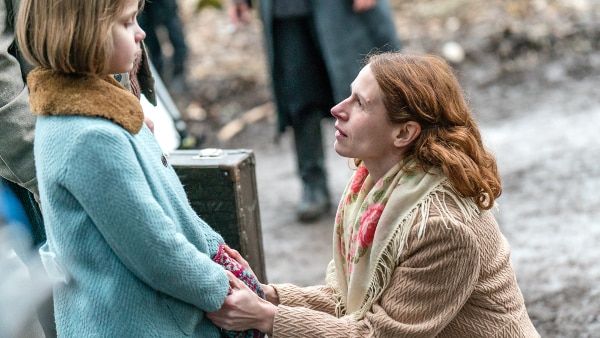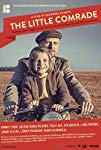Eye For Film >> Movies >> The Little Comrade (2018) Film Review
The Little Comrade
Reviewed by: Amber Wilkinson

This well-realised debut drama from Moonika Siimets is one of six feature films commissioned to mark the celebration of 100 years of the Republic of Estonia. Based on the autobiographical novels Comrade Kid And The Grown-Ups and Velvet And Sawdust by Estonian author Leelo Tungal, the film recounts the tale of her childhood in the 1950s as Stalinism tightened its grip on the country.
Told from six-year-old Leelo's (Helena Maria Reisner) perspective, the film offers a child's eye view of the changes happening in her homeland - where taking things at face value with the innocence of a youngster offers a sweet hopefulness but could have deep ramifications for her family. When the story begins, Leelo's teacher mum Helmes (Eva Klemets) and dad Feliks (Tambet Tuisk) are already under suspicion of spreading anti-Soviet sentiment and the discovery of an Estonian flag in their home results in Helmes being taken in for questioning. Telling her daughter to be good so that she comes home faster, Leelo takes the instruction to heart, believing herself to be partly responsible for her mum's continued absence.

The film hinges on her literal acceptance of what adults tell her, so she is easily swayed by the propaganda songs that play on the radio and dreams of becoming a 'little comrade' in the Soviet 'young pioneers' without realising the implications of what is going on. Meanwhile, her family, desperate to protect her from the adult reality, soon discover that her 'little knowledge' could prove dangerous - especially regarding her dad's sporting prowess.
By focusing on Leelo, Siimetsis has made her film accessible for younger audiences, while also helping adults to feel the anxiety of the grown-ups in the film, as they strive to keep the family together. The film hinges on the bond between Leelo and her increasingly worried dad, showing the stoicism of a family pulling together in the face of a gathering threat. Reisner is a real find as the young star and Siimetsis gets a performance from her that has a summer's day brightness to it. The intelligent script illustrates the way that a child's mood can change suddenly, so that a race can go from fun to a chore and back again in a heartbeat. The child's eye view also has that 'kind of funny, kind of sad' quality - such as when she tells her aunt that being sent to Siberia would be okay as she would see her brother again. This lack of nuance in her reactions helps keep sentiment at bay even at moments of high emotion, so that the end result is moving without being mawkish.
Beyond the performances, Siimetsis shows a sharp attention to detail, from the propaganda pin badge Leelo clutches like a talisman, to the sound design that emphasises things like the whistle of the wind at just the right moment. Kristina Ago's costume design is also notable, with Leelo's baby blue coat offering the same sort of brightness to the screen that her optimistic attitude gives to her family, the colours switched out for more autumnal hues when the film takes a more serious turn later on. Cinematographer Rein Kotov, who previously put in excellent work on the likes of Tangerines, captures the woodland in all its earthiness and helps to get us down to Leelo's level by showing us the world as she sees it. An impressive debut that celebrates the triumph of resilience and hopefulness over fear and oppression.
Reviewed on: 26 Nov 2018















